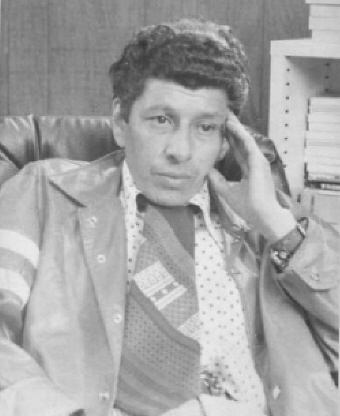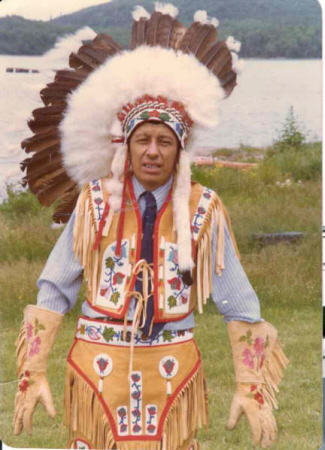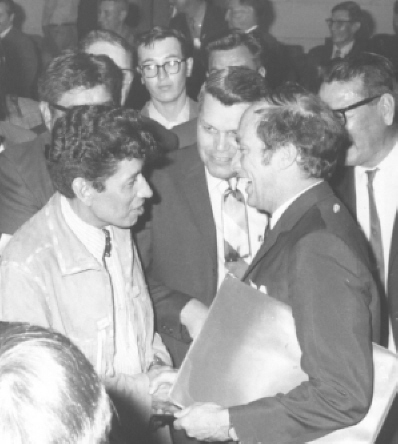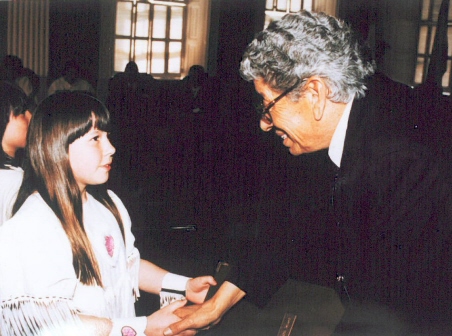 |

 |
 |

 |

1938 - 1996
October 4, 1996 Halifax Herald
Chief Noel Doucette: inspirational role model
This column was originally meant to pay tribute to a living Noel Doucette but sadly, the Great Father, in His wisdom, has intervened. Chief Noel Doucette, a dedicated man and founding president of the Union of Nova Scotia Indians, passed away on July 24, 1996.
Noel Jr. was born to Noel and Cecilia (Christmas) Doucette at St. Rita's hospital in Sydney on March 16, 1938. With the exception of five years spent at the Shubenacadie Residential School and one year in Moncton, he resided in Membertou until his 16th birthday.
Noel's education began at Membertou Indian Day School, then on to Shubenacadie for five years; returning home from the residential school at age 13, he attended Sydney Academy for two years and then went on to Moncton for a year of study at St. Joseph's University. Although he attended a variety of education facilities afterwards, including courses at St. F.X. and at the Nova Scotia Agriculture College, Noel considered himself to be a man who was primarily self-educated.
I can say from my personal observations of his demeanour at meetings we both attended that his lessons from the University of Life were well absorbed; he was a true diplomat when dealing with people.
In 1954 Noel joined the RCAF, serving until 1964 at various posts across Canada. During that time, on October 28, 1958, he married Jean Doris Johnson of Chapel Island. Over the years they became the proud parents of 12 children. Upon his release from the service, they set up housekeeping in Chapel Island, of which community he was chief for several terms.
With 12 children to provide for, it amazes me that he found the time to involve himself in far-flung political and voluntary activities. His example in this regard provides an inspirational role model for us all!
I met with Noel at the old Ponderosa Tavern in Bible Hill in 1967. During our chat, over a few beer, he laid out plans to organize the Union of Nova Scotia Indians and asked me to join in the effort. Due to educational, and other commitments at the time, I had to decline; but I did support the concept with enthusiasm. Stemming primarily from his labours, and with the full support of the Mi'kmaq community behind it, the Union was registered in 1969 and he became its founding president.
During a long conversation we had last winter, Noel and I discussed the advancements that were made by the Mi'kmaq since the Union was founded. On the down side, we agreed that our people's dependence on government assistance for sustenance had increased substantially over the past 27 years, and that this dependence was a major negative factor in efforts to realize Mi'kmaq self-rule.
Perhaps a quote, attributed to the famous American author John Steinbeck by D. H. Raddall, best describes our feelings about the Great White Father's paternalistic intervention in our affairs: "The Indians survived our open intention of wiping them out, and since the tide turned, they have weathered our good intentions towards them, which can be much more deadly."
But, in spite of the before-mentioned, we did conclude that substantial progress had been made in some areas. For instance, our communities have much more control over education, housing, etc.; and, perhaps most important, our people have acquired the skills needed to fight the open discrimination which, for the better part of five centuries, has caused so much grief and pain. Therefore, we agreed, the Union had made a difference.
At the end of our talk, Noel presented me with a Saint Anne's medallion which hangs above my desk. Then he told me that his greatest personal loss, and the one which caused him his greatest trauma in life, was the untimely death in a car accident on February 25, 1989 at Ben Eoin, Cape Breton, of his beloved son of 28 years, Cecil Stephen. I offered words which I hope comforted a father still grieving over a tragic loss.
Noel and I disagreed at times in regards to the methods the Mi'kmaq Nation should employ in pursuing its return to self-government. But I believe we held each other in mutual respect, and respected each others right to have views that sometimes differed. With this in mind, and with the knowledge that he always had the best interests of the Mi'kmaq Nation at heart, I have no hesitancy in stating that Nova Scotia society has become a much more welcoming place for our people because of his efforts.
His active participation in Mi'kmaq politics, his work as a commissioner with the Nova Scotia Human Rights Commission (1973 -1989), his work with service clubs and other activities too numerous to mention here, and his unselfish devotion to the cause have helped change things radically for the better for Nova Scotia's Mi'kmaq. For this he is esteemed!
During his career, Noel was involved in many firsts, such as the Union, but the deed he was the proudest of was that he, as a member of the Indian Advisory Council in 1967, led the way in insisting that the Shubenacadie Indian Residential school be shut down. Later in the same year, he was the person who made the successful motion at a council meeting which saw this mission accomplished!
Joe B. Marshall, the present President of the Union, says of Noel: "The way I remember him was that he was always very resourceful. No matter how difficult things got, Noel would find a way...He always carried a hope that self-reliance would come for our people through economic development. Whenever there was an economic development venture being contemplated...you could be sure Noel was there.”
May the Great Spirit grant Noel peace and tranquillity in the Land of Souls, and reunite him with Cecil for a joyful reunion!
Daniel N. Paul


